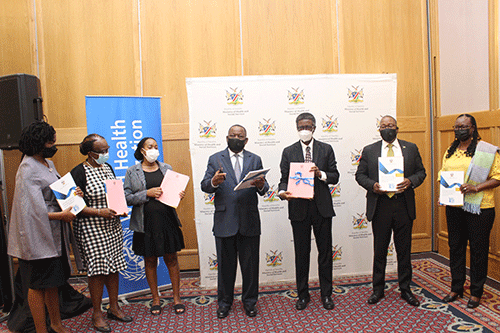Health minister Dr Kalumbi Shangula said maternal and perinatal death rates remain a major challenge, hence the need to invest in skilled care during pregnancy, childbirth and the postnatal period.
Shangula said this at the launch of the National Guidelines: Antenatal Care for a Positive Pregnancy Experience and Maternal Record in the capital yesterday.
He informed Namibia is a signatory to various international commitments, including the goals for ending preventable maternal and child deaths by 2035 and the Sustainable Development Goals by 2030.
“Quality and effective antenatal care (ANC) reduces complications from pregnancy and delivery, reduces stillbirths and perinatal deaths, and offers an opportunity for integrated care during pregnancy,” stated Shangula.
Maternal mortality ratio is the number of women who die from pregnancy-related causes while pregnant or within 42 days of pregnancy termination per 100 000 live births.
The data are estimated with a regression model using the information on the proportion of maternal deaths among non-AIDS deaths in women aged 15 to 49, fertility, birth attendants, and GDP.
Namibia’s maternal mortality rate for 2017 was 195.00, a 5.8% decline from 2016.
The new ANC model aims to ensure equitable access to, and appropriate utilisation of quality antenatal care services provided by appropriately skilled healthcare workers to enable the client to achieve a positive pregnancy experience.
The ministry has developed the National Guidelines for Antenatal Care for a Positive Pregnancy Experience in 2020 to guide health workers to provide integrated antenatal care services to all pregnant women and adolescent girls for the delivery of evidence-based interventions to improve maternal, fetal, neonatal health and survival.
Shangula urged the guidelines to be scrupulously used for the benefit of expecting mothers and the overall improvement of the healthcare system when it comes to catering to them.
World Health Organisation (WHO) representative, Dr Charles Sagoe-Moses said the guidelines cover recommendations in various areas including nutrition, maternal and fetal assessment, preventative measures, interventions for common physiological symptoms and interventions to improve antenatal care utilisation and quality of care.
“Women die as a result of complications during and following pregnancy and childbirth. Most of these complications develop during pregnancy and most are preventable or treatable. Other complications may exist before pregnancy but are worsened during pregnancy, especially if not managed as part of the woman’s care,” noted Sagoe-Moses.
He added ANC is one of the key services provided for the mother and the unborn baby which is an essential part of basic primary healthcare during pregnancy and offers key interventions that can prevent, detect and treat risk factors.
The director of primary healthcare services, Naemi Shoopala said the guideline aims to provide pregnant women with respectful, individualised, person-centred care at every contact.
“Implementation of effective clinical practices (interventions and tests) is as well as the provision of relevant and timely information, psychosocial and emotional support, by practitioners with good clinical and interpersonal skills within a well-functioning health system is a must,” said Shoopala.
Shoopala said the new guidelines assist clients and their families to develop a birth plan, including the facility of choice when it comes to the delivery, transportation: how will she get to the facility when labour starts, method of payment for expenses at the health facility and others.
- psiririka@nepc.com.na


